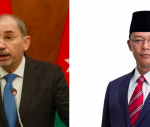You are here
The end of Ebola
Oct 19,2014 - Last updated at Oct 19,2014
The Ebola epidemic is threatening not only West Africans’ lives, but also the progress towards democracy, economic growth and social integration that Liberia, Sierra Leone and Guinea have made in the last decade.
In order to protect their achievements, the three countries’ governments, which comprise the Mano River Union, must buttress their response to the current epidemic with a coordinated strategy to prevent future outbreaks.
But they cannot do it alone. Though several experimental treatments and at least two candidate vaccines had been in development when Ebola emerged unexpectedly early this year, progress had stalled well before any were deemed ready to be tested in humans.
After all, clinical research to assess the safety and effectiveness of new drugs and vaccines can happen only during an epidemic.
As health workers labour tirelessly to care for those who have been infected, monitor those who may have come in contact with the virus, and prevent further transmission, researchers have a limited window of opportunity to learn how to treat and prevent the disease.
In order to accelerate progress, governance of the clinical trials must be transparent and all knowledge about the disease, including developments regarding potential treatments and vaccines, must be shared openly — imperatives that will require strong public health leadership in both the Mano River countries and the developed world.
The good news is that some progress is being made, with several vaccine clinical trials already under way.
Moreover, with support from the World Health Organisation (WHO), at least one international platform for clinical trials has been created to assess the safety and efficacy of experimental Ebola treatments, as well as to establish scientific and ethical standards of care.
Unfortunately, these efforts lack adequate involvement by West African researchers, clinicians, health workers and health officials.
Running clinical trials under the auspices of affected countries’ health ministries and the WHO — with full transparency in terms of processes and outcomes — would enable the relevant authorities to make timely and informed decisions regarding which treatments and vaccines to investigate further and when to deploy them.
The fight against infectious diseases like Ebola is one that affects everyone. In order to succeed, we must capitalise on the expertise of individuals and groups that have been quietly, diligently, and independently studying such diseases.
They must share with those at the front lines of the battle information about diseases’ natural history, modes of transmission, and risk factors, as well as preclinical data on — and clinical responses to — experimental treatments.
At the same time, more scientific expertise must be devoted to analysing the shared data and providing new ideas about prevention and treatment.
If researchers are not coming forward on their own, health ministries and organisations must develop strategies to attract them — and fast. We need as many ideas as possible.
To be sure, such an “open source” approach is not standard practice in pharmaceutical research and development. But the current crisis has laid bare the inadequacy of the prevailing approach.
In fact, the current Ebola epidemic is not the first public health disaster to highlight the failings of the existing system.
Pharmaceutical companies have been reluctant to make the anti-retroviral medications used to treat HIV/AIDS available in a cost-effective manner for public health use.
With business interests dictating global pharmaceutical priorities, developing countries consistently lose out — with devastating consequences.
In any public health crisis — especially one like the current Ebola outbreak — potential profits cannot guide drug development or deployment.
As soon as a vaccine or treatment is deemed suitable for implementation, it must be made available in large quantities, to be administered quickly to citizens at no cost to them.
Of course, transparent clinical trials and open-data platforms raise legitimate ethical and intellectual-property concerns. Compassionate drug use (the provision of experimental drugs in urgent circumstances) remains controversial.
And, given the high cost of R&D, pharmaceutical companies are naturally concerned about competitors reverse-engineering their drugs.
But these longstanding concerns should not be allowed to impede efforts to address the immediate threat that Ebola poses.
Instead, the current crisis should reinvigorate debate about these issues, with the goal of refining the balance between public health and business interests and thereby improving the global response to future crises.
In the meantime, these concerns underscore the need for public health officials to be involved in monitoring and coordinating clinical trials, and for improved information sharing among experts and affected countries.
An open-data platform would facilitate discussion of the social value of clinical research and the associated ethical dilemmas.
Time is of the essence. The world needs a flexible, adaptive, ethical and transparent approach to treatment and prevention that allows for rapid decision making in the development phase and effective coordination in the deployment phase.
The countries affected by today’s devastating Ebola epidemic will undoubtedly feel its impact for years to come. With strong public health leadership and effective coordination in the fight against infectious disease, people in West Africa — indeed, the entire world — would be able to rest assured that another resurgence of Ebola was not just around the corner.
The writer is executive director of the Open Society Initiative for West Africa. ©Project Syndicate, 2014. www.project-syndicate.org













